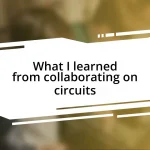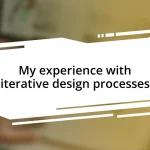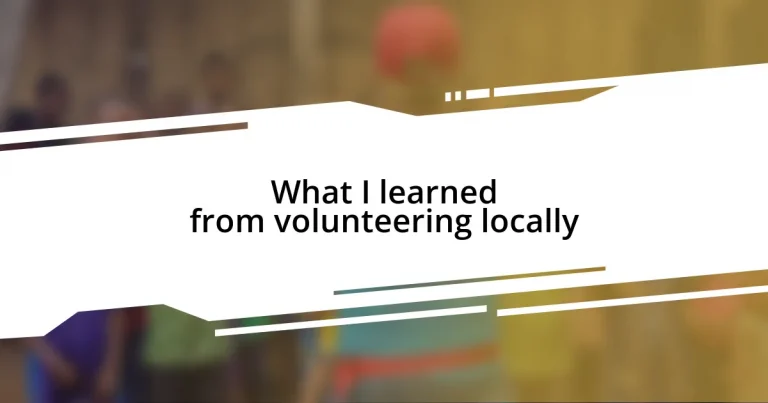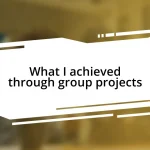Key takeaways:
- Local volunteering fosters community connections and personal fulfillment through various activities, such as tutoring and clean-ups.
- Key benefits of volunteering include personal growth, networking opportunities, emotional fulfillment, and improved mental and physical health.
- Developing skills like project management, empathy, and communication enhances both personal and professional life.
- Flexibility, active listening, and setting clear intentions are essential for effective volunteering and making meaningful connections.
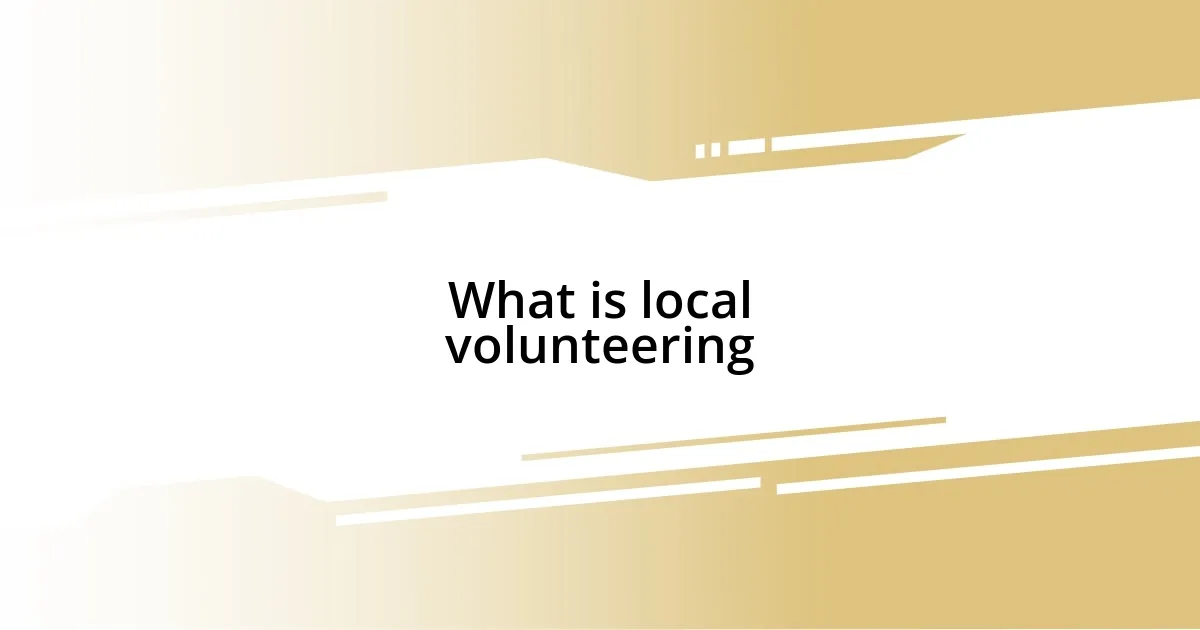
What is local volunteering
Local volunteering is about giving your time and skills to communities in your vicinity, often addressing immediate needs and fostering connections between neighbors. I remember my first experience helping at a food bank; it was eye-opening to see how much joy a simple meal could bring to someone in need. Have you ever realized how a small act can create such a ripple effect in your community?
When I volunteer at local shelters, I’ve noticed genuine interactions taking place—people sharing stories, laughter, and support. Each time I lend a hand, it fills me with a sense of purpose and reminds me how deeply interconnected we all are. It makes me wonder: how often do we overlook the power of our own communities in making a difference?
Local volunteering can encompass a wide range of activities, from tutoring children to participating in neighborhood clean-ups. Each of these efforts contributes to building a stronger, more resilient community. Have you thought about how your unique talents might serve those around you? That’s the beauty of local volunteering; it invites everyone to play a part in creating positive change right where they live.
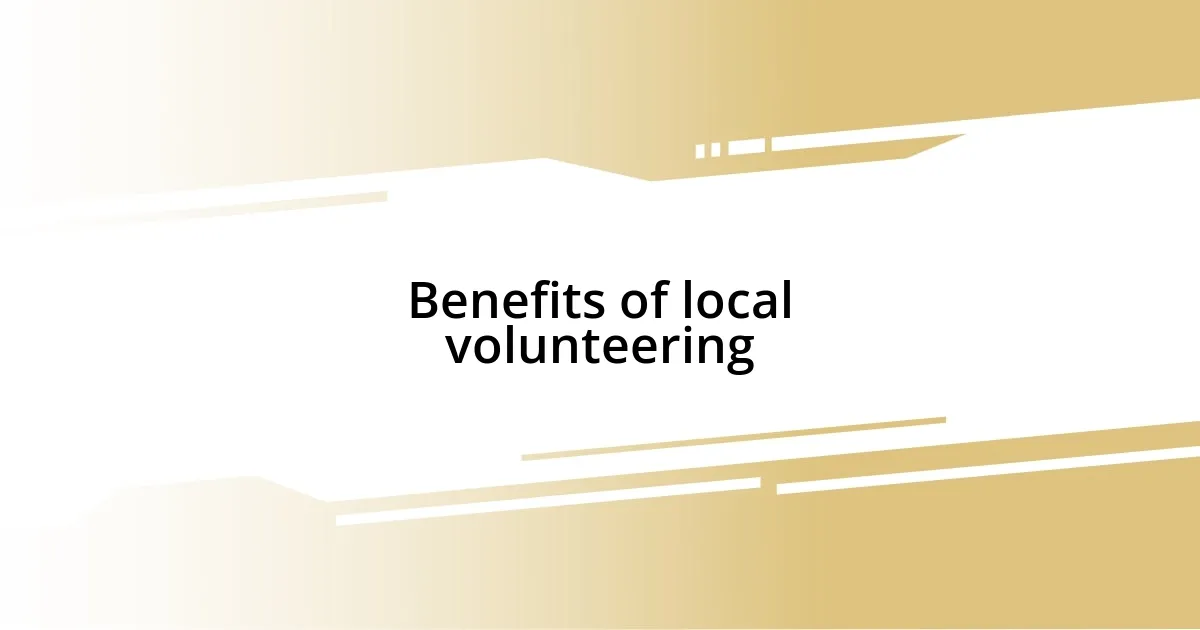
Benefits of local volunteering
Volunteering locally offers an incredible array of benefits that can truly transform your perspective on life. One of the most significant advantages I’ve experienced is the profound sense of community that develops. When I volunteered at a community garden, it was more than just planting vegetables; it became a gathering of diverse individuals with shared goals, which fostered friendships and a sense of belonging. Engaging in these activities can truly deepen your connection to where you live.
Here are some key benefits of local volunteering:
- Personal Growth: I discovered new skills I never knew I had, like gardening and public speaking, just by participating in local events.
- Networking Opportunities: I met amazing people, expanding my social circle and creating potential professional connections.
- Emotional Fulfillment: There’s a unique joy in helping others, which boosts your mood and sense of purpose, a feeling I’ve cherished deeply after each volunteering session.
- Increased Awareness: Volunteering opened my eyes to the challenges faced by my neighbors, making me more compassionate and aware of the community’s specific needs.
- Improved Mental and Physical Health: Engaging in volunteer work can lower stress and improve overall well-being—I’ve felt more energetic and balanced since I started.
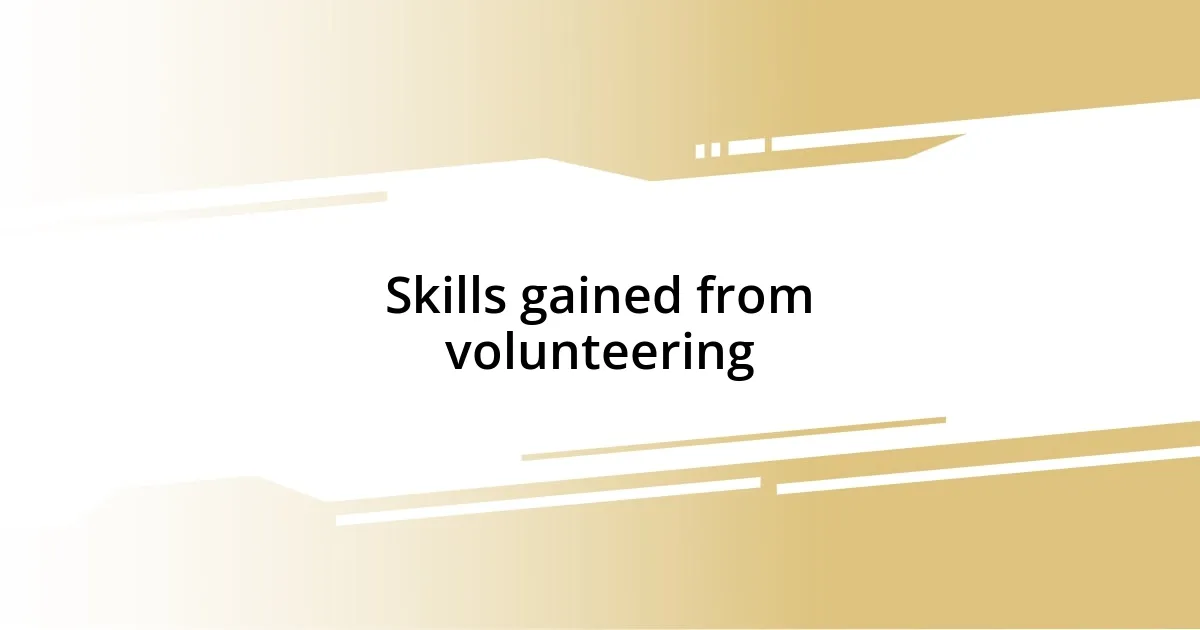
Skills gained from volunteering
Volunteering has uniquely equipped me with an array of skills that I never anticipated. For instance, while organizing community events, I honed my project management abilities—balancing tasks, deadlines, and team coordination became second nature. These experiences have taught me not only how to lead but also how to listen and collaborate effectively with diverse personalities.
Another skill that emerged from my volunteer efforts is empathy. Working closely with individuals from various backgrounds allowed me to step into their shoes and truly understand their challenges. I remember chatting with a single mother at a clothing drive; her story struck a chord with me and changed the way I view hardship. This heightened sense of awareness has enriched my interactions with others, enabling me to connect on a deeper level.
Additionally, volunteering has refined my communication skills significantly. During a literacy program where I assisted adults in improving their reading, I developed the ability to explain concepts clearly and patiently. It was rewarding to witness their progress and see their confidence grow. The ability to convey information relatable is something I carry into my everyday interactions beyond volunteering.
| Skill Gained | Description |
|---|---|
| Project Management | Organizing events and tasks effectively. |
| Empathy | Understanding and sharing the feelings of others. |
| Communication | Conveying ideas clearly and effectively. |
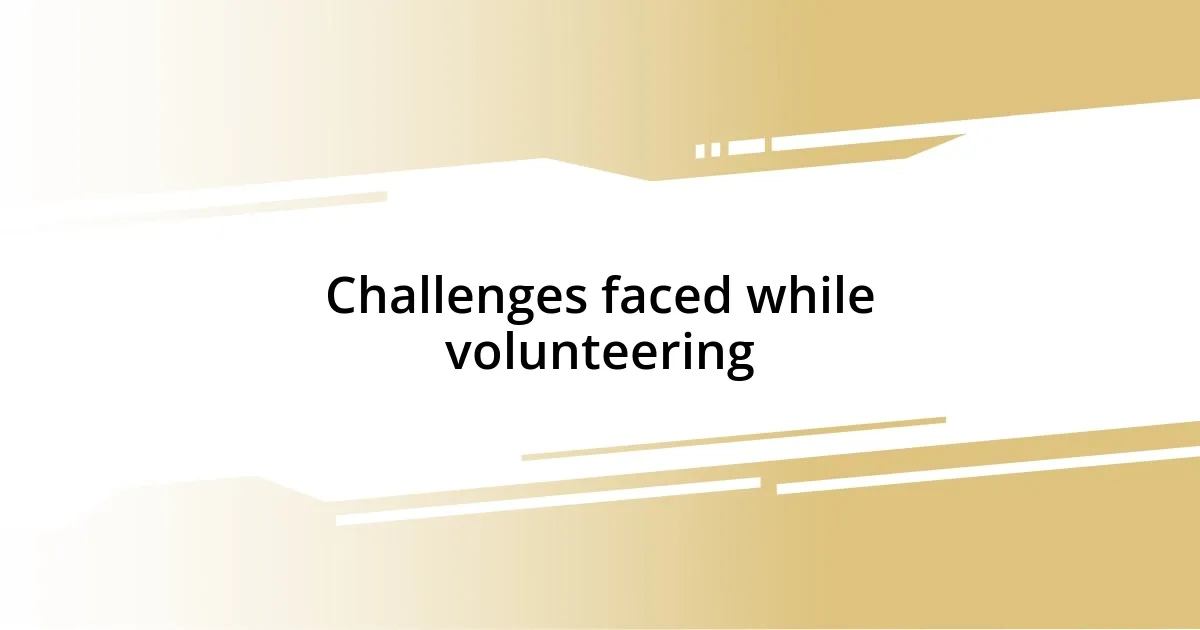
Challenges faced while volunteering
One of the biggest challenges I faced while volunteering was managing my time effectively. Balancing my personal life, work commitments, and volunteer hours was like juggling flaming torches. There were days when I felt overwhelmed, questioning whether I could maintain the energy needed to contribute meaningfully. But overcoming that challenge taught me invaluable time-management skills—something I now cherish in my daily life.
Another hurdle was navigating diverse opinions within the team. In one instance, while planning a fundraiser, it seemed like every suggestion led to a heated debate. I remember how frustrating it felt when consensus was elusive. Ultimately, I realized that embracing these differences was crucial; it pushed me to develop my conflict resolution abilities and fostered deeper connections with my fellow volunteers.
Lastly, encountering emotional burnout was a real wake-up call. During a particularly challenging outreach program, I found myself empathizing so deeply with the individuals we were assisting that I felt drained afterward. Have you ever felt like supporting others left you with nothing left to give? I certainly did. It made me prioritize self-care and reflect on the balance between giving and receiving support, a lesson that has significantly enhanced my overall volunteering experience.
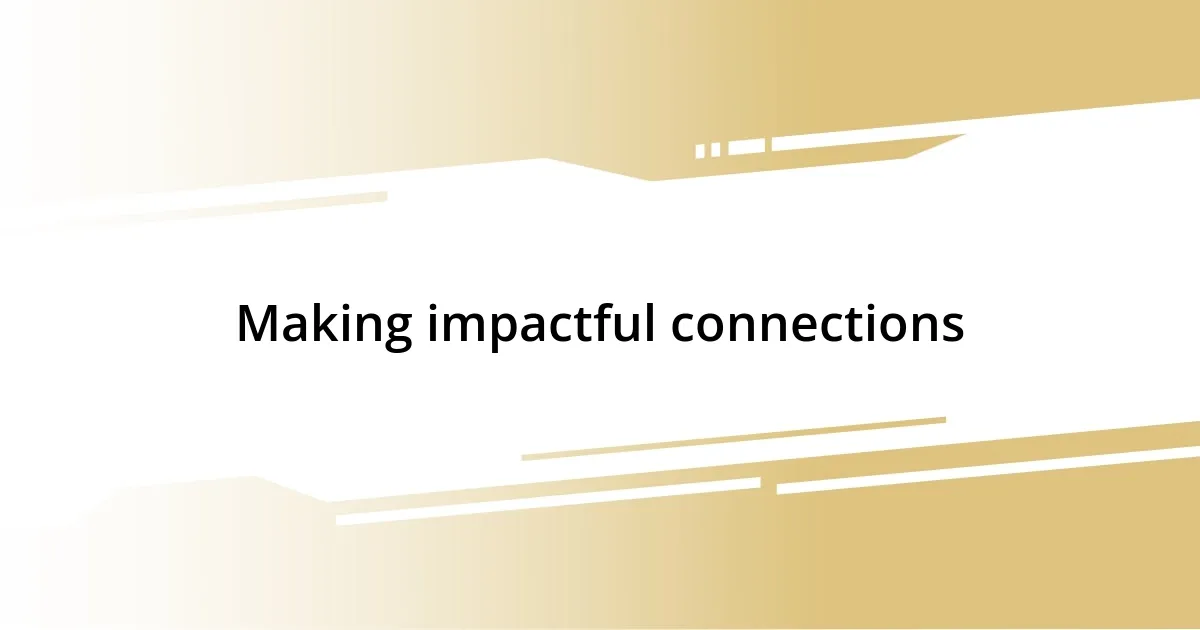
Making impactful connections
Connecting with others through volunteering is where some of the most profound experiences take place. I vividly remember meeting an elderly gentleman at a community garden initiative. He shared stories of his youth, and as he spoke, I felt a bridge form between our generations. Isn’t it fascinating how simple acts can lead to meaningful bonds that transcend age and background? The exchange gave me a new perspective on valuing wisdom and experience that often goes unrecognized.
During my time volunteering at a soup kitchen, I found myself forming unexpected friendships with both the volunteers and the patrons. One evening, a fellow volunteer approached me with a heartfelt story about her struggles with homelessness. It made me realize that everyone has a story, and often, those stories contain invaluable lessons about resilience and hope. Have you ever encountered someone who changed your outlook with just a few words? For me, those conversations became a catalyst for deeper connections with people I would have otherwise overlooked.
Moreover, volunteering has allowed me to build a strong network of like-minded individuals who share a passion for making a difference. At a local animal shelter, I developed relationships with people who not only cared for animals but also inspired me to be more active in advocacy. The synergy of our efforts created a collective motivation that propelled us to take on greater projects. It’s incredible how investing time in shared goals can forge lasting friendships, don’t you think? Each connection made became a thread in the fabric of my community, a reminder that we’re stronger together.
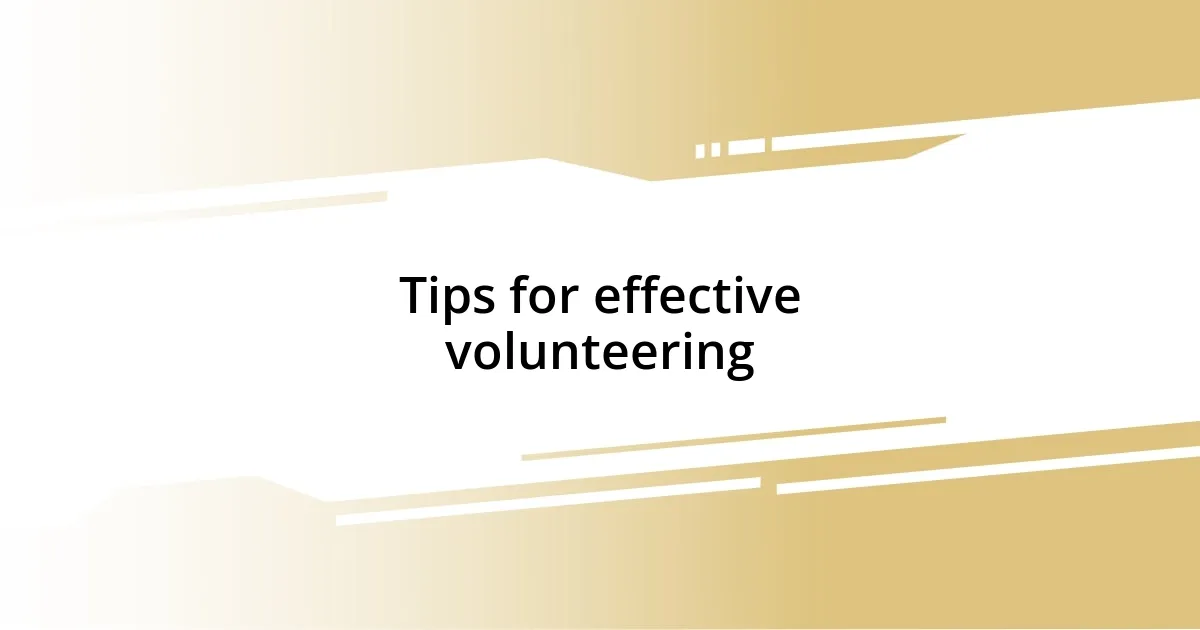
Tips for effective volunteering
When I began volunteering, I quickly learned the importance of being flexible. One time, I showed up to a clean-up event, only to find out that the planned location had changed last minute. Instead of feeling frustrated, I embraced the shift and ended up working in a different area that exposed me to a community I hadn’t yet engaged with. Have you ever realized that sometimes what seems like an inconvenience can actually lead to rewarding experiences? This adaptability is crucial; it allows you to make the most of every situation, enhancing not just your experience but also the impact you can have.
Another tip I’ve discovered is to truly listen to others. I once volunteered at a mentoring program, and I remember a young girl who struggled to express herself. Instead of rushing to offer solutions, I took the time to engage her in conversation, asking open-ended questions to help her articulate her thoughts. That moment opened up a floodgate of insight, helping me understand her challenges on a deeper level. Isn’t it interesting how listening can transform a simple interaction into a profound connection? This approach not only enriches your volunteering experience but also cultivates a sense of trust and community.
Lastly, setting clear intentions before you begin a volunteer role can significantly enhance your effectiveness. I vividly remember joining a literacy program, excited to help children read better. However, it wasn’t until I articulated my goals—like wanting to foster joy in learning—that I experienced true fulfillment. I noticed that having a purpose steered my actions and kept me motivated, especially when things got tough. Do you think it’s easier to stay engaged when your intentions are aligned with your actions? From my experience, clear intentions create a roadmap that guides your efforts, making your contributions more impactful and meaningful.



